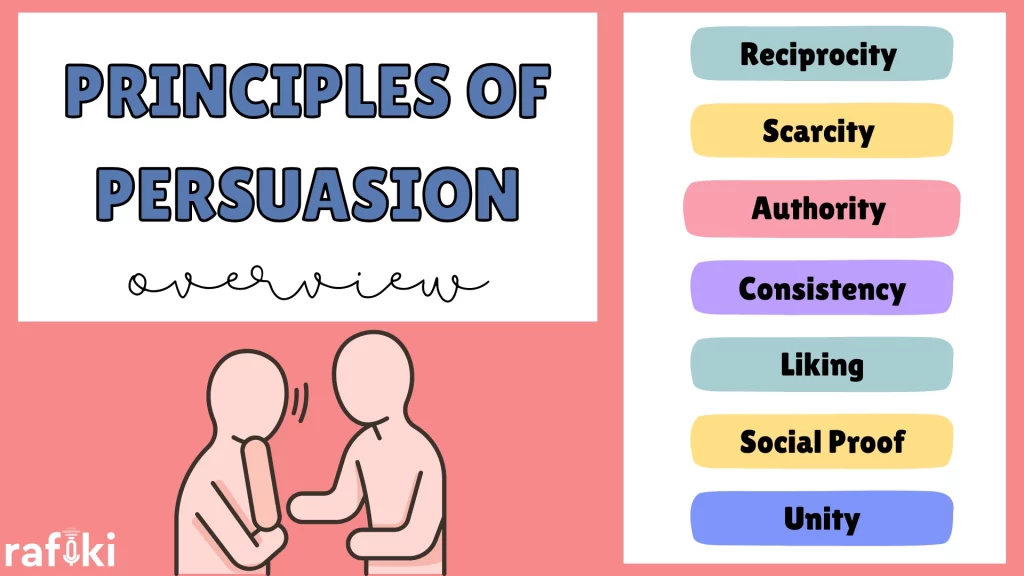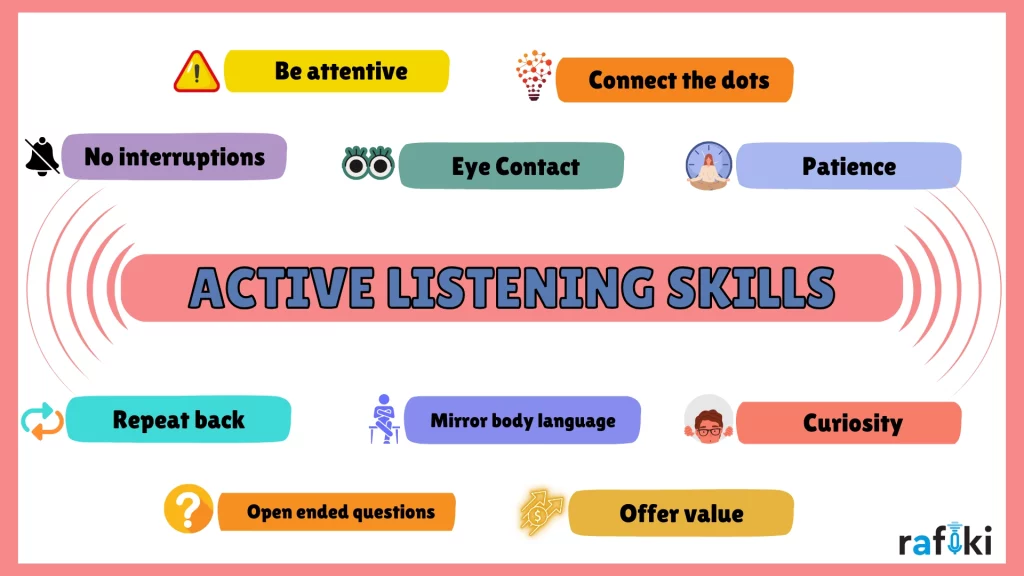Why Rafiki
Pricing


Pricing
Solutions

RevOps Leaders
Synchronize revenue generating functions

SDR Leaders
Get your team aligned and Coach your Reps 3x faster at scale

Sales Leaders
Unlock pipeline truth, drive confident forecasts

Have you ever wondered why when you go out to lunch with a friend, they pay for the meal and the next time you go out, you feel the urge to take care of the bill? That’s the Law of Reciprocity.
This principle, deeply ingrained in human behavior, states that we feel compelled to return favors or gifts we receive. In the context of sales, it highlights the importance of giving value to potential customers before asking for anything in return. By offering genuine help, insightful resources, or even small gestures of appreciation, you can tap into this powerful human tendency and pave the way for lasting customer relationships.
Dr. Robert Cialdini, “The Godfather of Influence” outlines here his 7 “Principles of Persuasion”:

In sales, the law of reciprocity translates to the power of giving value upfront. By offering potential customers something valuable before asking for a sale, you trigger this natural human tendency to reciprocate. However, this doesn't necessarily mean offering discounts or free products; it's about providing genuine value that demonstrates your expertise, builds trust, and positions you as a helpful resource.
Here's how reciprocity works in the sales landscape:
Ultimately, it's important to remember that authenticity is key. Don't manipulate or pressure customers into reciprocating. Instead, focus on building genuine connections and providing value that genuinely benefits them. By understanding and leveraging the Law of Reciprocity, sales professionals can build stronger relationships, create lasting value for their customers, and ultimately achieve sustainable sales success.
Harnessing the power of reciprocity requires a shift from simply selling to building genuine connections. Here are seven practical strategies your sales team can implement:
Share informative blog posts, white papers, or e-books that address your ideal customer's pain points. This establishes you as a thought leader. Moreover, this also positions you as a valuable resource even before they buy.
Host informative webinars on relevant industry topics. This showcases your expertise, allows potential customers to engage directly, and undoubtedly demonstrates your commitment to education over just selling.
Take the time to understand individual customer needs and tailor your interactions accordingly. Offer personalized recommendations for products, services, or even third-party resources that could benefit them.
Identify opportunities to go beyond the bare minimum. This could involve offering free trials, extending deadlines, or providing additional support beyond the initial sale. Remember, it's about genuine helpfulness, not gimmicks.
Actively listen to customer concerns, ask thoughtful questions, and demonstrate genuine interest in their needs and challenges. Building trust and rapport through active listening is essential for fostering long-term relationships based on reciprocity.
Use Rafiki's Smart Call Summaries to capture key moments from customer conversations to inform the value you'll be gifting to the prospect.

Send SWAG and freebies to your top prospects to let them know you’re grateful and are excited about continuing a professional relationship. You could also send them an UberEats coupon in return for an online lunch meeting. Make a custom action figure of your prospect as a superhero and send it with a thoughtful handwritten note.
Spread good words about your champion whenever you speak with other prospects in the same account. This will make your champion fight their hardest for your offering.
A software salesperson offers a free consultation to a potential client, going beyond just showcasing the product and taking the time to understand their specific needs and challenges. The rep then shares a customized report with actionable recommendations, even if they don't directly involve the salesperson's product. This genuine helpfulness establishes trust and positions the rep as a trusted advisor, increasing the likelihood of closing the deal down the line.
A financial advisor goes the extra mile for a client by researching and recommending a specific investment opportunity outside of their own portfolio that aligns perfectly with the client's financial goals. This unexpected act of assistance fosters a strong sense of trust and appreciation, solidifying the relationship and potentially leading to future referrals and long-term business.
A real estate agent, aware of a client's interest in a specific neighborhood, proactively researches upcoming open houses and community events. They share this information with the client, even if the events don't involve properties they are directly representing. This proactive helpfulness demonstrates the agent's genuine interest in the client's success and strengthens the relationship, potentially leading to the client choosing them when they're ready to make an offer.
An IT service provider offers a free security audit to a potential client, identifying potential vulnerabilities and providing actionable recommendations. This valuable service, even if it doesn't directly result in a sale, showcases the provider's expertise and positions them as a trusted security advisor. This builds trust and makes the client more likely to consider them for future IT needs.
A retail sales associate remembers a customer's previous purchase and proactively suggests complementary items they might find useful. This personalized attention and genuine interest in the customer's needs, even if it doesn't lead to an immediate additional sale, fosters a positive relationship and increases the likelihood of the customer returning for future purchases.
These examples showcase the diverse ways sales professionals can leverage the Law of Reciprocity in their interactions. By consistently offering value, going the extra mile, and building genuine relationships, your sales team can cultivate customer loyalty and achieve long-term success.
In today's competitive landscape, simply having a great product or service isn't enough. Building trust and fostering long-term relationships with customers is essential for sustainable sales success. Moreover, the law helps your sales team to move beyond transactional interactions and cultivate genuine connections with potential customers.
Ready to unlock the power of reciprocity in your sales strategy? Implement the practical strategies outlined above, leverage the insights provided by conversation intelligence tools like Rafiki, and watch your sales team build stronger relationships, close more deals, and achieve long-term success.
Build Better Customer Relationships